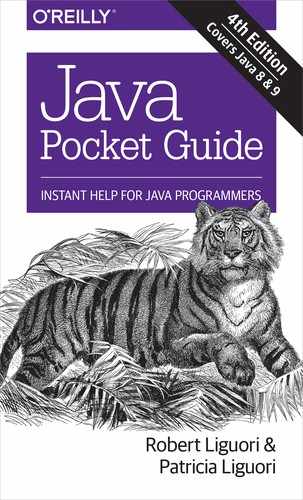Chapter 19. Lambda Expressions
Lambda expressions (λEs), also known as closures, provide a means to represent anonymous methods. Supported by Project Lambda, λEs allow for the creation and use of single method classes. These methods have a basic syntax that provides for the omission of modifiers, the return type, and optional parameters. The specification for λEs is set out in JSR 335, which is divided into seven parts: functional interfaces, lambda expressions, method and constructor references, poly expressions, typing and evaluation, type inference, and default methods. This chapter focuses on the first two.
λEs Basics
λEs must have a functional interface (FI). An FI is an interface that has one abstract method and zero or more default methods. FIs provide target types for lambda expressions and method references, and ideally should be annotated with @FunctionalInterface to aid the developer and compiler with design intent, as shown in the following code example:
@FunctionalInterfacepublicinterfaceComparator<T>{// Only one abstract method allowedintcompare(To1,To2);// Overriding allowedbooleanequals(Objectobj);// Optional default methods allowed}
λEs Syntax and Example
Lambda expressions typically include a parameter list, a return type, and a body:
(parameterlist)->{statements;}
Examples of λEs include the following:
()->66(x,y)->x+y(Integerx,Integery)->x*y(Strings)->{System.out.println(s);}
This simple JavaFX GUI application adds text to the title bar when the button is pressed. The code makes use of the EventHandler functional interface with the one abstract method, handle():
importjavafx.application.Application;importjavafx.event.ActionEvent;importjavafx.event.EventHandler;importjavafx.scene.Scene;importjavafx.scene.control.Button;importjavafx.scene.layout.StackPane;importjavafx.stage.Stage;publicclassJavaFxAppextendsApplication{@Overridepublicvoidstart(Stagestage){Buttonb=newButton();b.setText("Press Button to Set Title");// Anonymous inner class usageb.setOnAction(newEventHandler<ActionEvent>(){@Overridepublicvoidhandle(ActionEventevent){stage.setTitle("λEs rock!");}});StackPaneroot=newStackPane();root.getChildren().add(b);Scenescene=newScene(root,300,100);stage.setScene(scene);stage.show();}publicstaticvoidmain(String[]args){launch();}}
To refactor this anonymous inner class into a lambda expression, the parameter type needs to be either (ActionEvent event) or just (event), and the desired functionality needs to be provided as statements in the body:
// Lambda expression usageb.setOnAction((ActionEventevent)->{stage.setTitle("λEs rock!");});
See “Comparator Functional Interface” for another example of lambda expressions with the Comparator functional interface.
Method and Constructor References
A method reference refers to an existing method without invoking it. Types include static method reference, instance method of particular object, super method of particular object, and instance method of arbitrary object of particular type. Method references are lambda expressions that execute just one method, as demonstrated in the following examples:
"some text"::length// Get length of StringString::length// Get length of StringCheckAcct::compareByBalance// Static method refmyComparator::compareByName// Inst method part objsuper::toString// Super method part objectString::compareToIgnoreCase// Inst method arb objArrayList<String>::new// New ArrayList constructorArrays::sort// Sort array elements
Specific-Purpose Functional Interfaces
Annotated FIs listed in Table 19-1 have been established for specific purposes relative to the packages/APIs in which they reside. Not all functional interfaces in the Java SE API are annotated.
| API | Class | Method |
|---|---|---|
AWT |
|
|
AWT |
|
|
IO |
|
|
IO |
|
|
LANG |
|
|
Nashorn |
|
|
NIO |
|
|
NIO |
|
|
TIME |
|
|
TIME |
|
|
UTIL |
|
|
CONC |
|
|
LOG |
|
|
PREF |
|
|
General-Purpose Functional Interfaces
The java.util.function package is made up of general-purpose FIs for the primary use of features of the JDK. Table 19-2 lists them all.
| Class | Method |
|---|---|
|
|
|
|
|
|
|
|
|
|
|
|
|
|
|
|
|
|
|
|
|
|
|
|
|
|
|
|
|
|
|
|
|
|
|
|
|
|
|
|
|
|
|
|
|
|
|
|
|
|
|
|
|
|
|
|
|
|
|
|
|
|
|
|
|
|
|
|
|
|
|
|
|
|
|
|
|
|
|
|
|
|
|
|
|
|
Resources for λEs
This section provides links to tutorials and community resources about λEs.
